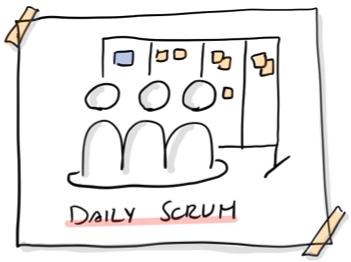I don't know if this has already happened to you, but I'm involved in a Daily Scrum and always feel "handicapped" afterwards. Why is that? The Scrum team makes exemplary use of the popular 3 Daily Scrum questions:

The Daily Scrum & Questions
It sounds something like this for everyone:
" Yesterday I processed and documented Jira ticket 116. I'm doing the test today. I don't have any disabilities."
After the third developer also rattles off the sentences like this, I personally feel a great handicap. But nobody else seems to mind - so am I alone in my perception?
Remove daily Scrum impediments
So what can you do as a Scrum Master in such cases? On the one hand, these questions, if formulated in this way, are too short-sighted or too small for me. On the other hand, this pattern of behavior often shows that the Daily Scrum was not understood as such, but is a status meeting. I would like to address both aspects here, but first I would like to explain why the Daily Scrum actually exists.

Purpose of the Daily Scrum
In the current Scrum Guide the purpose of the Daylie is defined as follows:
"The purpose of the Daily Scrum is to review progress towards the Sprint Goal and adjust the Sprint Backlog as needed to align the upcoming planned work."
Scrum Guide 2020
It is therefore emphasized here that the daily is an exchange regarding the "progress towards the sprint goal" and that this is reflected on the basis of the sprint backlog.
The next thing I notice when reading is that these three questions no longer appear in the current version. Instead, the following is emphasized:
Developers can choose any structure and techniques as long as their Daily Scrum focuses on progress towards the sprint goal and creates an actionable plan for the next working day. This creates focus and promotes self-management.
German translation of the Scrum Guide 2020
It is therefore explicitly emphasized that the developers themselves should choose a technique/structure for the Daily Scrum that makes sense for their context.
Questions in the Daily Scrum provide structure
Yes, questions give structure to the Daily Scrum and are a great technique, but not if the questions are just prayed down. If I have nothing to say about a question, I don't have to say anything. In other words, if I don't have a disability, I don't have to say "I don't have a disability". That's shorter, quicker and more valuable for everyone.
It is also very important not to get caught up in the minutiae, but to keep an eye on the big picture, i.e. the sprint goal. The Daily Scrum questions were therefore also adapted in the 2017 Scrum Guide. This has changed with the current Scrum Guide from 2020 was changed again and formulated much more freely. In the Scrum Guide currently states the following:
The Developers can select whatever structure and techniques they want, as long as their Daily Scrum focuses on progress towards the Sprint Goal and produces an actionable plan for the next day of work. This creates focus and improves self-management.
Scrum Guide 2020
What are you going to do with your new freedom?
The most important thing about the Daily Scrum should be a good exchange between the developers and deliver the following things:
- How is progress towards the sprint goal?
- What is our action plan for the next day?
You decide in your Scrum team what helps you to get these answers. Even if you have been working together for a long time, it can be very valuable to revisit your Reflect on the Daily Scrum. For example, you can use the Sprint Retrospective to consider how you can use your Daily Scrum more effectively. The result can be recorded in team rules, for example, and kept available and visible to everyone so that it can be practiced more easily.
It is also important for your Daily Scrum that:
- It always takes place at the same time
- It always takes place in the same place
- It takes place on every Sprint Day
- Product Owner or Scrum Master, if they are actively involved in the Sprint Backlog, participate as developers in the Daily Scrum.
How do you organize your Daily Scrum? Please leave a comment.
Your Anna Rudat

Write a comment